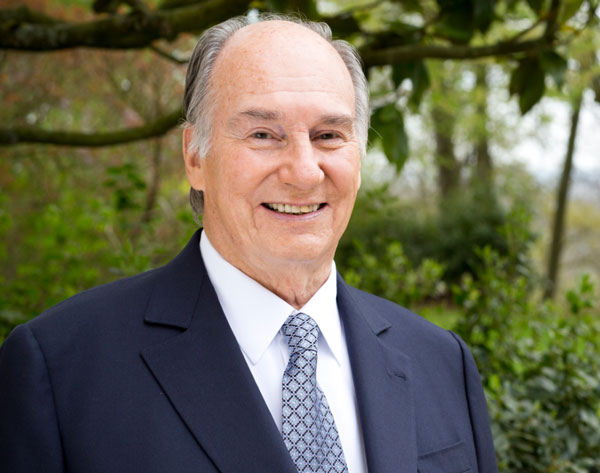
Profile: The Aga Khan
In the context of his hereditary responsibilities, The Aga Khan has been deeply engaged with the development of countries around the world for close to 60 years through the work of the Aga Khan Development Network (AKDN), writes akdn.org.
The AKDN is a group of private, international, non-denominational agencies working to improve living conditions and opportunities for people in specific regions of the developing world. The Network’s organisations have individual mandates that range from the fields of health and education to architecture, rural development and the promotion of private-sector enterprise.
Together, they work towards a common goal – to build institutions and programmes that can respond to the challenges of social, economic and cultural change on an on-going basis. The AKDN works in close partnership with public and private institutions, including amongst others, governments, international organisations, companies, foundations, and universities.
AKDN’s social development agencies include the Aga Khan Health Services, Aga Khan Planning and Building Services, Aga Khan Education Services, Aga Khan Academies, the Aga Khan Agency for Microfinance, the Aga Khan Foundation, Focus Humanitarian Assistance as well as two universities, the Aga Khan University and the University of Central Asia.
The Aga Khan Trust for Culture co-ordinates AKDN’s cultural activities, including the Aga Khan Award for Architecture, Historic Cities Programme, Aga Khan Music Initiative, Aga Khan Museum, and Aga Khan Program for Islamic Architecture (at Harvard and MIT).
The Aga Khan Fund for Economic Development (AKFED) is a for-profit development agency dedicated to building enterprises in tourism, banking, insurance, media, aviation, industry and infrastructure. AKFED reinvests profits in further development initiatives.
The Ismaili Muslims are a global, multi-ethnic community whose members, comprising a wide diversity of cultures, languages and nationalities, live in Central Asia, the Middle East, South Asia, sub-Saharan Africa, Europe and North America.
The Aga Khan succeeded his grandfather, Sir Sultan Mahomed Shah Aga Khan, as Imam of the Shia Ismaili Muslims in 1957 at the age of 20. Since taking on his role in 1957, he has dedicated his efforts to improving the quality of life of the most vulnerable populations, while emphasising the view of Islam as a thinking, spiritual faith: one that teaches compassion and tolerance and that upholds human dignity.
In recognition of his exceptional efforts and contributions to human development and improving the social condition of societies globally, the Aga Khan has, over the last six decades, received numerous decorations, honorary degrees, and awards from institutions and nations across the world.
 The Independent Uganda: You get the Truth we Pay the Price
The Independent Uganda: You get the Truth we Pay the Price



Congratulations to all Ugandans on the 55th Independence day. I was born in Uganda and look forward to more progress in Uganda for Ugandans.
>>will receive an honor for the economic contributions he has made to the Uganda.<< Pretty pathetic coverage – if that's all will be mentioned today! Aga Khan is being honoured [sic: we have to use UK English in Uganda] this year since it is his Diamond Jubilee of becoming the Aga Khan – i.e. the Imam of the Shia Ismaili Muslims. In those 60 years he contributed much more than as an investor. His schools and dispensaries were the first to open up to African students and patients. His "coronation" – Takhtnashini – in August 1957 took place in Kampala on the grounds of his jamatkhana, no less, when the Lukiko withdrew their consent that the ceremony be conducted at Nakivubo stadium. They said only Baganda kings could be crowned on public land in Buganda. Then in 1972 the Highness played a hero’s role (to Uganda Asians) of negotiating the settlement of seven thousand or so stateless Uganda Asians (a majority Ismailis) in Canada through his friendship with the Canadian prime minister Pierre Elliot Trudeau. His uncle Prince Sadruddin played an equally heroic role as head of the UNHCR in rescuing six thousand or so stateless Uganda Asians and taking them to refugee centres in Europe. At this time UNHCR were having to cope with the displacement of 500,000 people from South Sudan, many to Uganda! So the Aga Khan and his uncle are part of that history and let us not forget most Uganda histories do use the 1972 expulsion as a pivot point. The other pivot is the advent of the NRM administration. The Aga Khan was one of the early "returnees" to Uganda when his schools, dispensaries and prayer halls were restored to him. That then brought out the investor in the Aga Khan – the Monitor newspaper, the Serena Hotel, and what will be remembered tomorrow, the almost-billion-dollar 260MW Bujagali hydro project. Sure a great investor, but you don't get the Most Excellent Order of the Pearl of Africa for just that. That’s what the medal will be – a medal in the form of a 10kg gold chain reserved for Heads of States. Commercial: ALL of the above is recorded in my book Uganda Asians, now completed at 2333 pages, 1.8 million words. It started as a magazine for the Aga Khan’s Golden Jubilee (August 2007) and ends in his Diamond Jubilee year. H E President has endorsed it twice as “a national asset in Uganda’s commercial diplomacy.” Governor of the Bank of Uganda Professor Tumusiime-Mutebile has said I contributed 1.8 million words to Uganda’s “intellectual GDP.” He said that would translate to Uganda’s “real GDP” by show-casing the “new” Uganda. I said how about my “pocket’s GDP” and we booth just LOLOLOL. He’s a friend.
Vali what a joke .